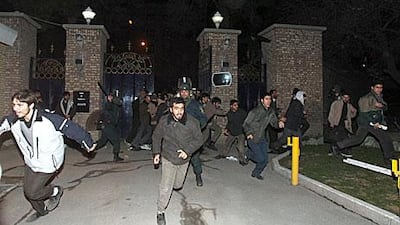A sprawling British diplomatic compound in an upmarket north Tehran suburb is usually an oasis of green tranquillity in the midst of Iran's teeming and polluted capital.
Parrots flutter between towering plane trees and foxes frolic on the landscaped lawns where British envoys sip tea in the hot summer months under the shadow of the snow-dusted Alborz Mountains.
But the Gulhak Garden, as the 200,000-square-metre site is known, is now at the centre of a row between London and Tehran which threatens to further strain relations that have long been tense. Nor are the gardens so verdant today.
The compound's British "occupiers" have been accused of environmental vandalism after they allegedly cut down and burnt more than 300 trees. Tehran municipality officials said this week they have slapped the British embassy with a US$1.23 million (Dh4.5m) fine for the "crime".
Britain insists no healthy trees were felled. But it had to remove a "small number" that died of "natural causes and become dangerously unstable" after the compound's water supply was disrupted by the extension of the Tehran Metro nearly three years ago.
The embassy has been working with the Iranian authorities, including the Tehran Municipality, "to re-establish a water supply as a matter of urgency to ensure that any environmental damage is kept to a minimum", a spokesperson for the British Foreign and Commonwealth Office (FCO) said.
Even so, Tehran's mayor, Mohammad Bagher Qalibaf, announced at the end of last month that he is going to court in an attempt to reclaim the Gulhak compound. He insists the British embassy has no legal right to the prime real estate.
The compound, bordered by high walls, is home to a cemetery with the graves of more than 500 British and Commonwealth soldiers killed in the two world wars. Several British diplomats and some Iranian embassy staff are housed in the Gulhak complex, although ambassadors for decades have lived several miles away at the historic British embassy on Ferdowsi Avenue in central Tehran.
Observers suspect Mr Qalibaf may be using the Gulhak issue to boost his profile ahead of the 2013 presidential election, which he is due to contest. Baiting a former imperial power that the regime derides as the "Little Satan" could appeal to many.
"The role of the British Government in trying to destroy our national unity and territorial integrity is known to everyone," the mayor said.
Many Iranians are suspicious of Britain because it meddled in Iran in the 19th and 20th centuries. According to an old Iranian proverb, "If you trip over a pebble, you can be sure it was put there by a Briton".
Iran still views Britain as a great power with global reach.
That flattering perception will be little consolation to Dominic Chilcott, Britain's new ambassador to Tehran, who took up his post
last month.
William Hague, the British foreign secretary, last week refused to rule out military action against Iran in the long term if there is no progress in Tehran's cooperation with the UN's nuclear watchdog. In turn, Ali Larijani, Iran's speaker of parliament, ordered the chamber's Foreign Policy and National Security Committee to consider a motion to downgrade relations with Britain.
The row over the Gulhak compound is adding to the friction. The land was given to Britain at the height of its imperial power by the Qajar monarchy in the 19th century for use as a summer residence for the British ambassador. Gulhak was then a small village, well outside the capital.
Demonstrating against the tree felling earlier this month, Iranian protesters carried placards reading: "There is no place for the old fox of colonialism in the Gulhak Garden" and "Death to Britain."
A conservative lawmaker, Seyed Hossein Naqavi, alleged on Wednesday that papers held by the British embassy to prove its ownership "have been forged".
The Iranian authorities last made an attempt to reclaim the Gulhak compound five years ago when 162 MPs demanded its return so that it could be turned into an anti-colonial museum. Iranian media reported that an ensuing investigation found the compound belonged "completely" to Iran while Iranian officials at the time said they would grant Britain ownership in exchange for Hyde Park in London. Britain, unsurprisingly, ignored the offer.
Its two diplomatic compounds in Iran have borne the brunt of periodic anti-Western demonstrations since the embassy of the "Great Satan" America became defunct 31 years ago. The US embassy, dubbed the "nest of spies", was turned into an anti-American museum and also houses a detachment of Revolutionary Guards.
The Israeli embassy was handed over to the Palestine Liberation Organisation after Iran's 1979 Islamic revolution.
During Israel's military operation against Gaza in 2008, hundreds of Iranians stormed into the Gulhak complex where they replaced the Union Jack with the Palestinian flag.
Britain has not been notified of any fine over the tree-cutting and has only heard about a possible legal challenge to Gulhak's ownership from Iranian media reports. But, its foreign office spokesperson said Thursday: "Based on previous court documents, we are confident that we legally own the site."
mtheodoulou@thenational.ae

